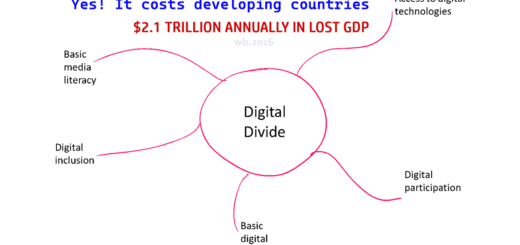Africa’s Digital Transformation: Beyond Hype, Towards Reality
The narrative surrounding Africa’s digital transformation often swings between two extremes: optimistic predictions of technological leapfrogging and concerns about impending technological deficits. While Africa’s potential for technology-enabled transformative change is undeniable, a more grounded and practical approach to digital transformation is needed. The hype about digital transformation and emerging technologies like Artificial intelligence (AI) and Analytics often overshadows the stark reality of the continent’s underdeveloped critical infrastructures for technological advancement. This essay argues that Africa’s digital transformation requires a strategic focus on addressing foundational requirements, such as access to electricity, internet connectivity, quality education, digital literacy, and an enabling environment, before we can meaningfully talk about the transformative potential of advanced digital technologies.
The consequences of neglecting these foundational elements can be detrimental to the success of digital initiatives. For instance, implementing AI-powered agricultural solutions without reliable electricity or internet connectivity would limit their reach and effectiveness. Leading experts in the field of digital transformation recognize this challenge and advocate for a phased approach. They emphasize prioritizing the establishment of fundamental elements, such as robust IT infrastructure, before integrating advanced digital tools like AI and Internet of Things (IoT) (Thompson, 2024).
Several studies underscore the critical role of foundational infrastructures and social systems for digital transformation (Riasanow et al., 2019; OECD, 2019; World Bank, 2021). These foundational requirements, essential for the development and use of digital technologies, include electricity, internet connectivity, education, and digital literacy and skills. Societies that genuinely aim for digital transformation must prioritize the development of these requirements and ensure they are robust, widely and equitably accessible, and affordable to the general public.
Looking into Africa through the lens of these foundational requirements reveals a complex web of underdevelopment, inequality, and lack of preparedness for today’s transformative digital advancements. It highlights the need to prioritize these foundational elements before discussing emerging technologies and their potential benefits, such as digital transformation, digital trade, and digital governance. While creating awareness of the wonders of digital advancement is encouraged, the primary focus must shift towards accelerating the systematic development of the foundational requirements for digital transformation.

Foundational Requirements: The Key to Africa’s Digital Transformation
One of the foundational requirements for digital transformation is reliable electricity. It is a bedrock for industrial development and powering digital devices, ensuring consistent access to digital services. However, in 2021, only 50.6% of Sub-Saharan Africa’s 1.18 billion population had access to electricity (Andree et al., 2024). The World Electricity Outlook Report for 2023 underscored that around 600 million people in Africa lack access to electricity, casting doubt on efforts to achieve universal access by 2030 (IEA, 2023).
Internet connectivity is equally a necessity for digital transformation, serving as the backbone for communication, information access, and use of digital tools. In 2023, only 37% of Africa’s 1.46 billion population had access to the internet (ITU, 2023). This indicates a substantial digital divide between those who can and cannot participate in the digital age. Affordability is another major hurdle. In many African countries, 1GB of mobile data can cost more than 7% of an average monthly income, making it a luxury for many citizens (A4AI, 2022). According to a report from Cable.co.uk (2023), Zimbabwe and South Sudan are among the most expensive countries in the world for mobile data. Both the limited access and high cost hinder Africa’s digital transformation aspirations, rendering online services unusable for a large segment of African society.
The Role of STEM Education, Digital Literacy and Digital Skills
Alongside the critical infrastructure, STEM (Science, Technology, Engineering, and Mathematics) is a critical prerequisite for digital transformation. A robust STEM education equips individuals with the digital literacy and computational thinking skills necessary to drive and adapt to the rapid technological advancements (UNESCO & SEAME, 2023). In fact, these skills form the engine of digital transformation, responsible for the efficient use, adoption and continuous development of digital technologies. However, Africa faces challenges in providing quality STEM education at the required level. Mutsvangwa & Zezekwa (2021) argue that Sub-Saharan Africa’s STEM education struggles with resource limitations, outdated curriculums, and low female participation, with only less than 25% of students in higher education pursuing STEM fields, and just 30% of those being female.
Another important factor for digital transformation is digital literacy and digital skills. A digitally literate society poses essential knowledges and abilities to effectively navigate through and utilize digital technologies, such as computing devices, applications and digital information. On the other hand, a digitally skilled workforce with specialized competencies to perform advanced technical tasks, such as components manufacturing, software development, data analytics, and cybersecurity ensures local capacity to efficiently adopt existing technologies and further innovate and develop new capabilities that are marketable locally and globally. Unfortunately, Africa faces challenges in both areas. Several sources reveal a concerning reality: Africa falling short of individuals equipped with essential digital literacy and skills when compared to the rest of the world. A global digital skills gap index by Wiley reported that African countries scored between 1.8 and five on a scale of ten (Wiley Gap Index, 2021), posing a significant barrier for building strong digital systems, institutions and jobs required to adapt to the ever-evolving digital era.
Creating an Enabling Environment for Digital Transformation
An enabling environment is also a crucial foundational requirement for digital transformation. A supportive enabling environment ignites a thriving digital ecosystem by building public trust in technologies, encouraging innovation and investment, and ensuring data protection and cyber security. According to reports from UNCAD, only 33 African countries (61%) have enacted data protection and privacy legislations, while 15 countries (28%) have no formal or reported laws (UNCTAD, n.d).
The way forward
Digital technologies hold immense potential for Africa, but a critical shift in focus is required in designing and implementing digital transformation initiatives. While the excitement surrounding emerging technologies is understandable, true progress necessitates prioritizing the development of foundational requirements. Here are a few logical steps that can be taken to build a sustainable digital transformation:
- The first step is to bridge the digital divide. This necessitates a multi-stakeholder approach, where a collaborative effort is required from governments, the private sector, academic institutions, and civil society organizations. Public-private partnerships can play a vital role in developing the necessary infrastructure to expand access to electricity and internet connectivity. These partnerships serve as the foundation upon which a robust digital ecosystem can be built. Additionally, affordability programs are essential to ensure equitable participation in the digital world for low-income communities. Finally, digital literacy training programs are crucial for equipping citizens with the skills necessary to use the digital platforms and services effectively.
- Next is cultivating a culture of innovation, entrepreneurship and digital skills development to unlocking Africa’s potential in the digital space. Several key strategies can achieve this, including:
- Supporting tech startups through funding and incubation programs provides the necessary resources and support to nurture promising ventures.
- Investing in research and development initiatives encourages technological advancements crucial to Africa’s digital future.
- Creating innovation hubs serves as focal points for collaboration and idea exchange, fostering a vibrant environment for innovation to flourish.
- Prioritizing STEM education at all levels to nurture and cultivate skilled workforce prepared to lead the digital revolution. This focus on STEM education will also empower Africans to develop homegrown solutions tailored to the continent’s unique challenges.
- Building public trust and confidence on digital technologies is a cornerstone for an inclusive and sustainable digital transformation. A robust data protection and privacy laws are essential to safeguard user information and build user confidence in digital platforms and services. Along with it, it is necessary to create cybersecurity awareness through public education campaigns to empower citizens with the necessary skills for safe digital experience. Furthermore, strong intellectual property (IP) protections, including copyright laws, are essential to incentivize innovation and ensure digital businesses are fairly protected and compensated for their digital products and services.
Conclusion
In conclusion, Africa’s digital transformation holds immense potential to drive socioeconomic development across the continent. However, realizing this potential requires a concerted effort to address foundational requirements before advancing to more complex digital solutions. The essay has underscored the critical need for reliable electricity, internet connectivity, quality education, digital literacy, and an enabling environment as prerequisites for meaningful digital transformation.
By prioritizing these foundational elements, African countries can bridge the digital divide, empower their populations with digital skills, and create an environment conducive to innovation and entrepreneurship. This strategic focus will not only unlock Africa’s potential in the digital space but also ensure that the benefits of digital transformation are accessible and inclusive, ultimately improving the lives of people across the continent.
It is imperative that stakeholders, including governments, the private sector, academic institutions, and civil society organizations, collaborate to develop and implement comprehensive strategies that address these foundational requirements. Only then can Africa harness the full power of digital technologies to drive sustainable development and improve the well-being of its people.
References
- A4AI (2022) Alliance for Affordable Internet. Available at: https://a4ai.org/ (Accessed: 20 April 2024).
- ABNT (2024) Leading Africa’s digital advancement: Paving the way, ABNT.com: Empowering Digital Transformation in Africa. Available at: https://abnt.com/?p=76 (Accessed: 22 April 2024).
- Andree, B.P.J. et al. (2024) World Bank Open Data. Available at: https://data.worldbank.org/ (Accessed: 20 April 2024).
- Cable.co.uk (2023) Worldwide Mobile Data Pricing 2023: 1GB cost in 237 countries, Cable.co.uk. Available at: https://www.cable.co.uk/mobiles/worldwide-data-pricing/ (Accessed: 21 April 2024).
- ITU (2023) Internet use, Facts and Figures 2023. Available at: https://www.itu.int/itu-d/reports/statistics/2023/10/10/ff23-internet-use/ (Accessed: 20 April 2024).
- Mutsvangwa, A. and Zezekwa, N. (2021) ‘STEM education: A ray of hope for African countries’, Unnes Science Education Journal, 10(2), pp. 79–89. doi:10.15294/usej.v10i2.45746.
- OECD (2019) Digital – OECD, Organisation for Economic Co-operation and Development . Available at: https://www.oecd.org/digital/ (Accessed: 21 April 2024).
- Riasanow, T. et al. (2019) (PDF) clarifying the notion of digital transformation: A transdisciplinary review of literature, ResearchGate. Available at: https://www.researchgate.net/publication/332444078_Clarifying_the_Notion_of_Digital_Transformation_A_Transdisciplinary_Review_of_Literature (Accessed: 21 April 2024).
- Thompson, P. (2024) A digital playbook that works, Heller Search Associates. Available at: https://www.hellersearch.com/blog/a-digital-playbook-that-works?utm_campaign=the-heller-report&utm_source=hs_email&utm_medium=email&_hsenc=p2ANqtz-8J_wypmyMP-Wi5poDIaZyqC8-hOzto74Z4TZyT77hP0O3c0nqR81PolUQG02fkm2FRoJmM (Accessed: 21 April 2024).
- UNCTAD (no date) Data Protection and Privacy Legislation Worldwide, UNCTAD. Available at: https://unctad.org/page/data-protection-and-privacy-legislation-worldwide (Accessed: 21 April 2024).
- UNESCO and SEAME (2023) Global Education Monitoring Report 2023, Southeast Asia: Technology in education: A tool on whose terms? [Preprint]. doi:10.54676/rjnf1598.
- Wiley Gap Index (2021) Global Rankings for digital skills: Wiley Gap Index, Wiley. Available at: https://dsgi.wiley.com/global-rankings/ (Accessed: 21 April 2024).
- World Bank (2021) World development report 2016: Digital dividends, World Bank. Available at: https://www.worldbank.org/en/publication/wdr2016 (Accessed: 21 April 2024).
Related posts: Digital Capacity for Sustainable Development: The Case of Africa | Navigating the AI Landscape in Africa | Trust in Technology and Government: A Cornerstone for Africa’s Digital Transformation




[…] post: Leapfrogging the Future: How AI can Transform Africa | AI Capacity Building in Africa | Unlocking Africa’s Potential…
[…] ABNT. (2024). The Impact of Artificial Intelligence on African Economies. Retrieved from https://abnt.com/?p=37 […]
[…] Related posts: Bridging the digital divide for inclusive & sustainable developmentReflection on the Digital Transformation Strategy for Africa (2020-2030)…
[…] posts: Bridging the digital divide for inclusive & sustainable developmentReflection on the Digital Transformation Strategy for Africa […]
[…] Related posts: Reflection on the Digital Transformation Strategy for Africa (2020-2030) […]